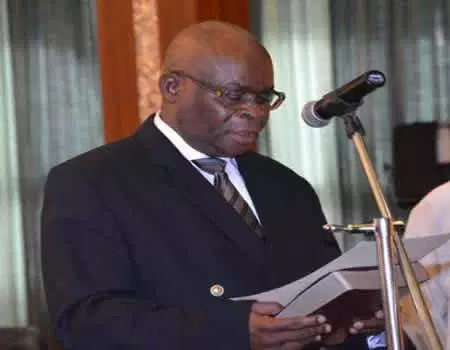Justice Walter Onnoghen is now officially the Chief Justice of Nigeria after his nomination was confirmed by the Senate.
Justice Onnoghen has been the acting CJN since November 2016. There were unexplained delays in the submission of his name to Senate for confirmation as the substantive Chief Justice of Nigeria. This delay draws the ire of his people from the southern part of the country.
With his confirmation, Justice Onnoghen becomes the first CJN from the southern extraction in 30 years. The last CJN from that region was Justice Ayo Gabriel Irikefe, who held the office from 1985 to 1987.
Before Justice Irikefe attained the post, there had been five other southern CJNs; Justice Adetokunbo Ademola (1958-1972), Justice Teslim Olawale Elias (1972-1975), Justice Darnley Arthur Alexander (1975-1979), Justice Atanda Fatayi Williams (1979-1983) and Justice George Sodeinde Sowemimo (1983-1985).
Between Justice Irikefe and Onnoghen, there were eight northern CJNs within a 30-year-period. They are Justices Mohammed Bello (1987-1995), Muhammad Lawal Uwais (1995-2006), Saliu Moddibo Alfa Belgore (2006-2007), Idris Legbo Kutigi (2007-2009), Aloysius Katsina-Alu (2009-2011), Dahiru Musdapher (2011-2012), Aloma Mariam Mukhtar (2012-2014) and Mahmud Mohammed (2014-2016).
The new CJN was questioned by the Senate for over an hour. When asked why there are rampant corruption cases in the country, he said the Nigerian judiciary was a product of a corrupt society. He promised to preside over a judiciary that is strong-willed and of unquestionable integrity.
He also assured that the judiciary over which he would preside would emerge from its present predicament and image crisis as a reformed and vibrant organ of state. “The judiciary under my watch will be of unquestionable integrity. I believe that the judiciary will come out of the present situation stronger,” he pledged.
He also assured the senators that the judiciary under his leadership would not be compromised, explaining that once the judiciary of any nation “is politicized, that is going to be the end of that country”.
On the setting up of special court to trial corruption cases, he said he had no issues with it but that merely setting up a separate court for corruption matters would not solve the problem, if the handlers of the cases fail to dutifully carry out their responsibilities. He cautioned that except the existing system is improved upon, the establishment of new courts would make no difference.
On the issue of conflicting court judgments, he said the problem was not totally alien to the course of adjudication. However, he identified two factors responsible for conflicting judgments, saying a conflicting judgment may arise when a plaintiff files a suit on one matter in a state and files another in another state.
Secondly, he said conflicting judgments could also arise when several appeals emanate from a single case, pointing out that a conflicting judgment in such instance occurs when a judge does not thoroughly examine all the appeals before delivering his judgment.
Justice Onnoghen also expressed concern over recurring cases of disobedience to court orders, noting that this could only be addressed by the legislature and the executive, adding: “The judiciary will welcome a day when a decision is handed down by the court and it is obeyed. That is when the judiciary will be independent.”
Justice Onnoghen also warned against unfounded accusations against judges, stating that whenever that is done, “you are dealing with the privileges of men and women who have no privilege of talking back”.
Justice Walter Onnoghen was born on December 22, 1950 in Biase, Cross River State, he attended the Presbyterian Primary School, Okurike, between 1959 and 1965.
He later proceeded to Accra, Ghana, to attend Odorgorno Secondary School, Adabraka, Accra, Ghana, between 1967 and 1972 for his West African Examination Council (WAEC) exam.
Onnoghen was at Accra Academy, Accra, Ghana, between 1972 and 1974 for his WAEC (A-Levels) before proceeding to the University of Ghana, Legon, Ghana, between 1974 and 1977 to obtain his Bachelor of Law Degree (LL.B (Hons) and graduated with 2nd Class Upper Division.
He attended the Nigerian Law School, Victoria Island, Lagos, between 1977 and 1978 for his B.L certificate. The jurist served as a Pupil State Counsel, Ministry of Justice, Ikeja, Lagos, between 1978 and 1979.
He later became a partner in the Law Firm of Effiom Ekong & Company, Calabar (1979-1988); and then Principal Partner/Head of Chamber of Walter Onneghen & Associates, Calabar, from 1988 to 1989.
From 1989 to 1998, he served as a High Court Judge, Cross River State Judiciary and was Chairman, Cross River State Armed Robbery and Fire-Arms Tribunal from 1990 to 1993.
He was appointed a justice of the Court of Appeal in 1998 and left in 2005 when he was elevated to the Supreme Court.
A fellow of the Chartered Institute of Arbitrators, Justice Onnoghen has attended several conferences and seminars around the world and is a member of the Body of Benchers and Life Bencher.




